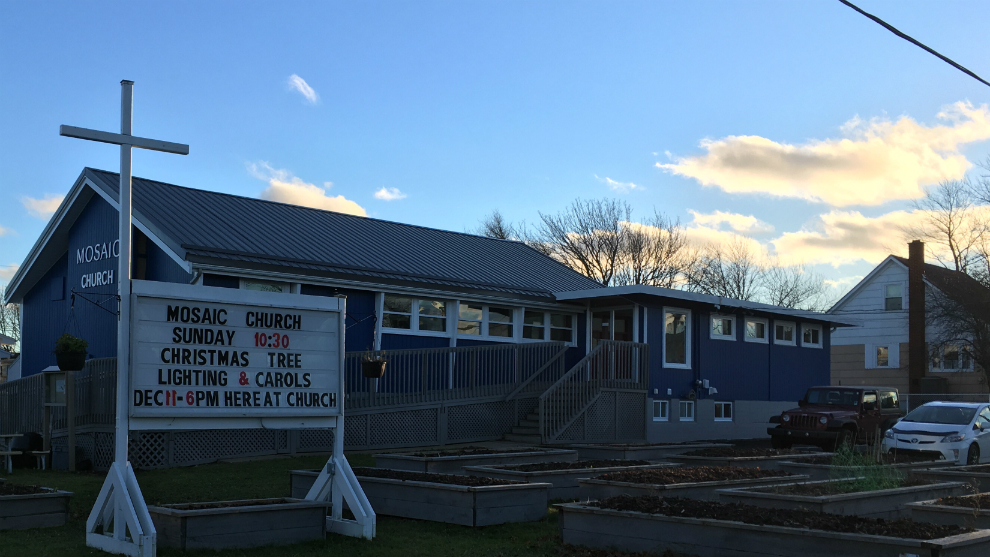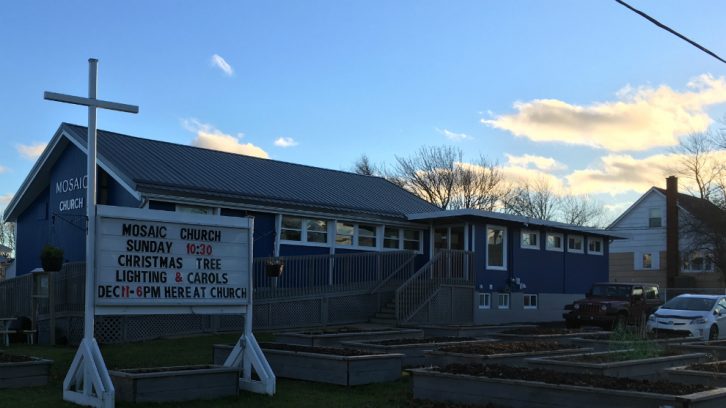Community
Fairview group seeks development of community hub
Fairview Yes Initiative considering options to bring people together

caption
The Mosaic Ministries church (28 Willett Street) is one of the proposed locations for a community hub in Fairview. The church would be renovated, with additional underground parking added.
caption
The Mosaic Ministries church is one of the proposed locations for a community hub in Fairview.The Fairview Yes Initiative is trying to develop a community hub that would bring together service providers and groups in Fairview.
Local activists, community workers, residents and politicians met Thursday night at the Mosaic Ministries church on Willett Street to discuss the project.
“We need to get the community behind us,” said Keith Wells, the pastor at the church and chair of the meeting. A hub, Wells explained, is any place where community members can go to learn skills, receive information and services and create relationships.
Fairview-Clayton Park MLA Patricia Arab said many people don’t understand the hub concept, but might support it if they did.
“The average person wouldn’t say that they want a hub, but they’ll talk to you about the need for seniors programming and for their children to have a safe place for activities,” she said.
One of the meeting’s main objectives was to determine whether a single-venue structure or a campus-style approach, that would adapt existing structures for hub activities, would better meet the needs of the community.
The general consensus was that a single-venue structure in a centralized location was the best approach. Meeting participants agreed that a single location would allow for an accommodation of larger groups, the centralization of information and organized fundraising.
Erin Findlay, a social worker with the community health team servicing Fairview, said that one location would help avoid duplication of social services.
“We have an increased need for collaboration among service providers to meet even the most basic of needs for folks here,” she said.
Andrew Curran, a community activist and a District 10 candidate in the recent municipal election, had the development of a community hub as part of his platform. He said that a single-venue approach would encourage socialization and “intergenerational programming.”
Arab agreed that the single-venue approach was the best choice, but questioned if it was realistic that a not-for-profit community group could compete for Fairview’s limited real estate with for-profit developers.
“My personal opinion is that one place for everybody is the best thing for this community,” she said. “The issue … is that there is no physical space in Fairview.”
The idea of a community hub has stagnated since a 2014 feasibility study, commissioned by the Fairview Community Association, concluded there wasn’t enough space in Fairview “dedicated to providing services for the vulnerable segments of the population.”
The 2014 report indicated three potential locations for a centralized hub in Fairview:
- A new building at Centennial Arena on Vimy Avenue,
- A new building at W.D. Piercey Field on Fredrick Avenue,
- A renovation of the Mosaic Ministries church on Willett Street.
Arab dismissed Centennial Arena, noting the arena’s owners already had their own commitments for the space.
Wells, the former chair of the Fairview Community Association, questioned the viability of building at W.D Piercey Field. He pointed out that Fairview already suffers from a lack of places for children to play.
“If you know anything about taking away green space in Fairview, that’s not an easy thing to do,” he said.
Arab suggested that renovating the Mosaic Ministries church and adding underground parking might be the most reasonable option.
The sentiment was echoed by Wells.
“There is no easily accessible, affordable or properly zoned land available,” he said following the meeting. “This points us in the direction of using existing building.”
‘Community resilience’ critical
The 2014 study stated that the creation of “community resilience” was critical for Fairview, citing the area’s high population density, issues of youth crime, large newcomer population and sizable low income population.
“Fairview is the most ethnically diverse community east of Montreal,” said Wells. “A hub makes that an asset because it fosters cross-cultural communication and understanding.”
In 2006, Fairview was identified by the United Way Halifax as one of three priority neighbourhoods in need of resident leadership. According to Laurie Cook, a project leader with the United Way’s Hub Project, the development of a hub in Fairview is part of the solution.
“We are firmly behind the idea of hubs as a strategy for reducing poverty and building strong neighbourhoods,” she said after the meeting.
The Fairview Yes Initiative plans to meet again in January to target a specific location for the development of a hub.
Wells expressed hope that Russell Walker, the councillor for the area, and Halifax West MP Geoff Regan would be able to attend.

